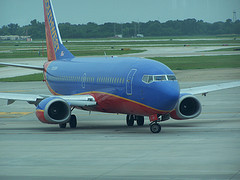 Last week, Southwest Airlines apologized to the family of a terminally ill boy after they would not allow him use of a specially made car seat that allows him to sit comfortably. They have advised they are working with the family and hope to learn from the experience to improve their practices.
Last week, Southwest Airlines apologized to the family of a terminally ill boy after they would not allow him use of a specially made car seat that allows him to sit comfortably. They have advised they are working with the family and hope to learn from the experience to improve their practices.
The concern appeared to be that the seat was not FAA approved. Car seats are supposed to be approved by the FAA and stamped in some way that they are approved for air use. The reasoning behind this is that some seats are not designed for both auto and air. So, the Flight Attendant was enforcing a policy that actually has a rationale. However, in the case of this child, the seat was specially made, as opposed to manufactured.
But, what alternatives did this family have but to give up their special seat and hold the child? That hardly seems safe either. It is possible a solution lay not with the FAA, but with the DOT.
The Air Carrier Access Act requires carriers to, upon request, provide a Complaints Resolution Officer at all times. Carriers must make passengers aware of the CRO’s availability and contact info any time a person complains or raises a concern with carrier personnel or contractors about discrimination, accommodations, or services for passengers with a disability that is not immediately resolved by carrier personnel.
Now, in the busy holiday season, by the time a CRO was found, they could have been taken off the plane. The family consented to remove their son from his safety device because they were convinced they would be unable to fly home any other way. It was, from all reports, a terribly trying incident in the midst of an already difficult family situation.
“They just wanted to cover their butts to make sure that they weren’t going to be fined by the FAA and, therefore, they decided the best thing for Southwest was to put my son at risk,” the boy’s father said. He also admitted that he knew the seat wasn’t FAA approved, but that the FAA didn’t have regulations to govern safety seats for larger children with a medical need, which is certainly an issue that should be addressed.
Flight attendants are charged with enforcing safety regulations, and it is true that enforcement is, to a degree, motivated by fear of fines. But that does not make the regulation less important.And there is a way the Dainiak family can petition to have the FAA reexamine its ruling or grant an exemption. You can find the link here. It would be a direct action we hope they will take to not only help their son, but to help similar children by encouraging a rule to be made to cover them. It seems a positive way to help, as opposed to claiming Southwest was only concerned about a fine.
Southwest has contacts for advising them of special accommodations. Did the family call and advise regarding the situation, knowing it could be a problem? The fact that some flight attendants overlooked a potential safety issue does not mean all flight attendants would, and you cannot count on that. We are very interested to see what Southwest comes up with. The need to enforce safety regulations and the need to assist those who have legitimate needs is a hard balance between two conflicting obligations.
What do you think?
Related articles
- Chris Dainiak, Father Says Sick Son Was Ordered Out Of Safety Seat By Southwest Airlines (huffingtonpost.com)
- NH Parents: Sick Son Ordered out of Safety Seat (abcnews.go.com)
- NH parents: Sick son ordered out of safety seat (seattletimes.nwsource.com)
